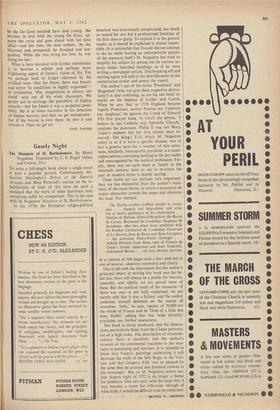Gaudy Night
To write a full-length book about a single event is now a popular pursuit. Unfortunately Mr. Garrett Mattingley's Defeat of the Spanish Armada and Mme Pernoud's treatise on the re- habilitation of Joan of Arc have set such a standard that the work of other historians may sometimes suffer by comparison. This is the case with M. Nogueres' Massacre of St. Bartholomew.
In the 1570s the European religio-political situation was enormously complicated, too much so indeed for any but a professional historian of the first class to grasp. To explain it to the general reader as it should be explained is almost impos- sible. (It is noticeable that Froude did not attempt to do so, while leaving an unforgettable picture of the massacre itself.) M. Nogueres has tried to simplify his subject by setting out its various as- pects under italicised headings, as if he were writing a newspaper article. This breaking off and starting again will add to the bewilderment of the uninstructed reader and annoy the expert.
The author's use of the terms 'Protestant' and 'Huguenot' (why not give their respective deriva- tions?) is also confusing, as are his too brief re- marks on the dogmas of Luther and Calvin. When he says that in 1558 England became 'legally Protestant, neither Puritan nor Lutheran but Anglican,' he ignores the Creed of Edward VI's first prayer book, in which the phrase, 'I believe in one Catholic and Apostolic Church,' confutes his statement. Philip II was not Mary Tudor's nephew but her first cousin once re- moved. The King's Evil, which M. Nogueres refers to as if it were a specific disease, was in fact a generic term for a number of skin infec- tions. Similarly, 'neuropathic psychism' is a mean- ingless phrase, conveying nothing to the lay reader and unrecognised by the medical profession. Fin- ally, there was no such meal as 'lunch' in the sixteenth century; here its use to re-create the past in modern terms is merely jarring.
These faults are not perhaps very important; they are less distasteful than the author's treat- ment of the main theme, in which a succession of minor characters crowds the pages and obscures the issue. For instance : The flaring torches enabled people to recog- nise . . . Aumale and Angouleme, and some ten or twelve gentlemen of less importance . . . Nicolas de Halwin. Edme d'Hautefort, the Baron de Cessac, Raymond de Cardaillac (Seigneur .de Sarlabous, who has often been confused with his brother Corbeyran de Cardaillac, Governor of Le Havre), Jean de Biran and three foreigners — the notorious Pietro-Paolo Tosinghi . . . Achille Petruzzi from Siena (one of Francis de Guise's former equerries) and Jean Yanowitz, nicknamed Besme . all very obscure persons.
In a volume of 168 pages such a list—and this is one of several—destroys symmetry and clarity.
One is left with the impression that the author's principal object in writing this book was the be- lief that there will always be a public for horrors; naturally, and rightly, we are spared none of these. But the political result of the massacre—if there was one—is not fully explained; we are merely told that it was a failure; and the author confesses himself defeated on the matter of casualties. 'Sully,' he says, 'speaks of 70,000 for the whole of France and de Thou of a little less than 30,000,' adding that this 'wide diversity' precludes any further assessment.
The book is nicely produced, and the illustra- tions, particularly those from the Clouet portraits, are of a high order. The description of sixteenth- century Paris is excellent, and the author's account of the continental reactions to the mas- sacre is interesting and succinct. It is valuable to know that Vasari's paintings celebrating it still decorate the walls of the Sala Regia in the Vati- can, and that Gregory XIII 'was so pleased by the news that he granted one hundred crowns to the messenger.' But, as M. Nogueres points out, that August night of 1572 is no longer a theme for polemics. One can only echo his hope that it may become a cause for reflection—though of what kind, it wou,41,11; difficult even to conjecture.
HESTER W. CHAPMAN






































 Previous page
Previous page